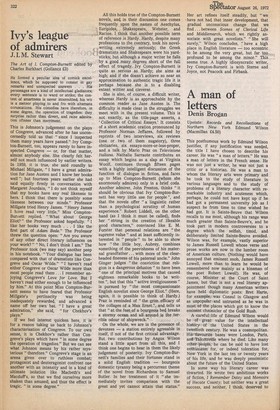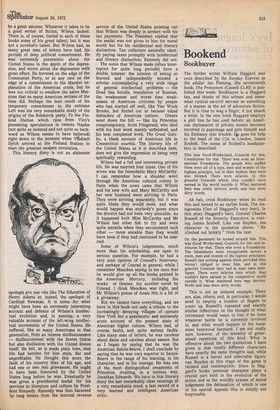A man of letters
Denis Brogan
Upstate: Records and Recollections of Northern New York Edmund Wilson (Macmillan £4.50) This posthumous work by Edmund Wilson justifies, if any justification was needed, the title I have chosen to describe his career. He was "a man of letters." He was a man of letters in the French sense. He was not just a writer, he was not just a critic or a historian. He was a man to whom the literary arts were primary and he took to the study of literature in various languages and to the study of problems of a literary character with remarkable industry and acuteness which, perhaps, he could not have kept up if he had got a permanent university job as I suspect he from time to time wished he had got. It is Sainte-Beuve that Wilson recalls to me most, although his range was much greater than Sainte-Beuve's, and he took part in modern controversies to a degree which the selfish, timid, and deliberately limited Sainte-Beuve avoided. Wilson was, for example, vastly superior to James Russell Lowell whose verse and prose works are now in the lumber room of American culture. (Nothing would have annoyed that eminent snob, James Russell Lowell, more than to learn he would be remembered now mainly as a kinsman of the poet Robert Lowell). He was, of course, Minister at the Court of Saint James, but that is not a real literary appointment though many American writers have held diplomatic posts: Bret Harte, for examplev was Consul in Glasgow and as unpopular and untrusted as he was in most *of the places which got to know the eminent chronicler of the Gold Rush.
A carefulAife of Edmund Wilson would be Of r, great value for the intellectual histdry of the United States in the twentieth century. He was a cosmopolitan. Hibrifavourite bases were London, Paris, andoTtilcOttville where he died. Like many othely Weopik3; he can be said to have lost enthlisiasm for, or indeed toleration for, New York in the last ten or twenty years of his life, and he was deeply pessimistic about the future of the United States.
In some way his literary career was thwarted. He wrote two ambitious works of fiction, I Remember Daisy and Memoirs of Hecate County; but neither was a great success, and neither, I think, deserved to be a great success. Whatever it takes to be a good writer of fiction, Wilson lacked. There is, of course, buried in each of these books some of his great talent; but it was not a novelist's talent. But Wilson had, as many great men of letters have had, his periods of deep political commitment. He was extremely pessimistic about the United States in the depth of the depression, and wrote about the depression with great effect. He hovered on the edge of the Communist Party, or at any rate on the edge of a commitment to the Marxist explanation of the American crisis, but he was too critical to swallow the naive Marxism that so many American writers of the time did. Perhaps the best result of his temporary commitment to the extreme Left was his very remarkable study of the origins of the Bolshevik party, To the Finland Station which runs from Vico's pioneering speculations in remote Naples (not quite so isolated and not quite so backward as Wilson seems to have believed) right down to the moment when VITlidimir Ilyich arrived at the Finland Station to start the greatest modern revolution.
This literary diary is not an elaborate apologia pro sua vita like The Education of Henry Adams or, indeed, the apologia of Cardinal Newman. It is notes for what might have been an extremely interesting account and defence of Wilson's intellectual evolution and, in passing, a very valuable account of the left-wing intellectual movements of the United States. He suffered, like so many Americans in that generation, from an intense disillusionment — disillusionment with the Soviet Union but also disillusion with the United States itself. He felt, as is made plain here, that life had become for him stale, flat and unprofitable. He thought this more the fault of his country than of his age, and had one or two real grievances. He ought to have been honoured by the United States long before he was. Eventually he was given a presidential medal for his services to literature and culture by President Kennedy. Kennedy was then harassed by long letters from the internal revenue service of the United States pointing out that Wilson was deeply in arrears with his tax payments. The President replied that the medal was not given to him for moral worth but for his intellectual and literary distinction. Tax collectors naturally identify paying taxes promptly with intellectual and literary distinction; Kennedy did not.
The notes that Wilson made (often interrupted for quite long periods) have a double interest: the interest of seeing so learned and independently minded a scholar contemplating a very wide range of general intellectual problems — the Dead Sea Scrolls, translation of Russian, the weaknesses and worse than weaknesses of American criticism by people who had started off well, like Van Wyck Brooks, but fizzled out or became bland defenders of American culture. Others went down the hill — like his Princeton comptemporary, Scott Fitzgerald, who died with his best work mainly unfinished, and his best completed work, The Great Gatsby, a bleak account of American life in Connecticut exurbia. The literary life of the United States as it is described here, does not give the impression of being very spiritually rewarding.
Wilson had a full and interesting private life. He was married four times. One of his wives was the formidable Mary McCarthy. I can remember how a shudder went through the American cultural colony in Paris when the news came that Wilson and his new wife and Mary McCarthy and her new husband were arriving in Paris. They were arriving separately, but it was quite likely they would meet, and what would happen was anybody's guess since the divorce had not been very amicable. As it happened both Miss McCarthy and Mr Wilson had other fish to fry and were quite amiable when they encountered each other — more amiable than they would have been if they had continued to be married.
Some of Wilson's judgements, much more than his scholarship, are open to serious question. For example, he had a very poor opinion of Conrad's Nostromo, and perhaps of Conrad in general, while I remember Mencken saying to me once that he would give up all the books praised in the American Mercury, including the works of Dreiser, for another novel by Conrad. I think Mencken was right, and Mr Wilson's praise of Anais Nin is a bit of a giveaway.
But we cannot have everything, and we have in this book not only a tribute to the increasingly decaying villages of upstate New York but a pessimistic and extremely acute account of the present state of American higher culture. Wilson had, of course, faults, and quite serious faults. Like many men of letters, he was careless about dates and careless about names. But as I began by saying that he was the American Sainte-Beuve, I shall conclude by saying that he was very superior to SainteBeuve in the range of his learning, in his character, and in his courage. He was one of the most distinguished ornaments of Princeton, rivalling, in a curious way, Jonathan Edwards. We have in this literary diary the last remarkably clear runnings of a very remarkable mind, a last record of a very learned and intelligent American critic.











































 Previous page
Previous page